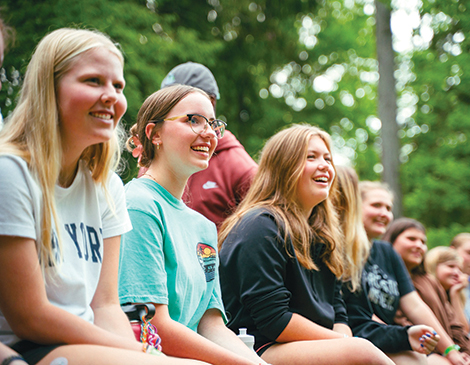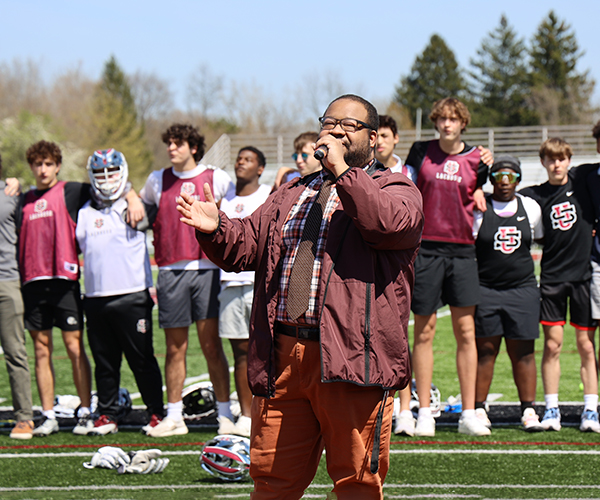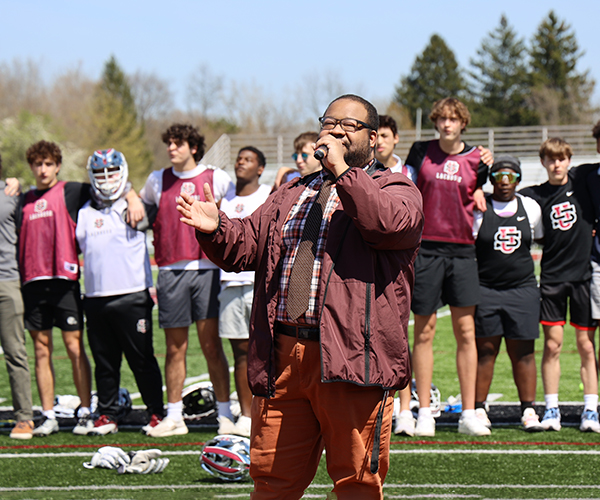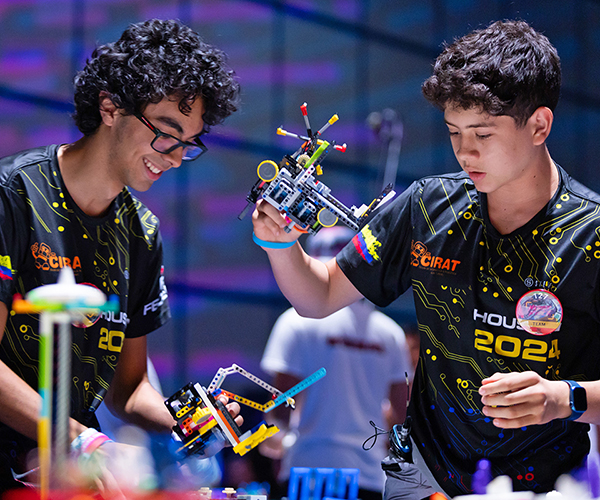Mackenzie Suter’s only sleep-away experience had been at her grandparents’ house. But at 13, she wanted to go away to summer camp like other kids her age — and not to a program that felt different than what other seventh-
graders would do.
Mackenzie has high-functioning autism spectrum disorder and attention-deficit/hyperactivity disorder, but her school day looks like everyone else’s and she is conscious about being seen as “typical,” says her mom, Heidi Suter, who understands that acceptance is a big deal to her daughter — and every kid, really.
Heidi turned to the Connecting for Kids Facebook page. The organization provides support, resources and community for any parent with concerns about a child. She posted the question: Can anyone recommend a great overnight camp for my daughter?
She landed on Camp Nuhop in Perrysville, located in Ashland County, about an hour and a half from their home in Avon Lake. The camp offers an array of programs, including a weeklong overnight camp. The website advertised an inclusive summer camp for all kids with a focus on those living with neurodiversities. So, Heidi gave the director a call.
“I wanted to find out what a day looked like and how kids were grouped,” she relates.
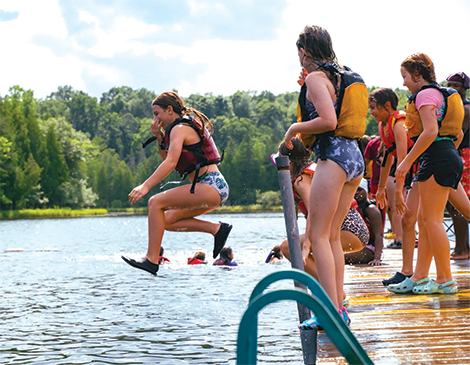
These are important questions because a lower counselor-to-camper ratio is helpful for a child who might need a bit of extra support or a break to calm down. Trevor Dunlap, executive director at Camp Nuhop, admits that parents fill out a “monster application” that allows the camp to thoughtfully place kids in groups of no more than eight campers to three staff members. Plus, there’s a mentor team that can swoop in and spend time with a kid if needed.
Mackenzie watched the camp’s video online, prepared by reading books about going to overnight camp and helped pack her own bags. “She gained a lot of confidence by being able to be away from us and meet new people,” Heidi says.
After the week, Mackenzie returned home with a log that counselors maintained, sharing daily activities and updates, including mood, which reinforced to Heidi that their family chose the right place. “Of course, we were more worried about it than Kenzie was,” she says.
Bigger picture, Heidi says the self-esteem boost from going to Camp Nuhop also showed her daughter that living away from home to go to college is possible. And that’s huge.
Today, there are more choices for families searching for camps that can accommodate physical disabilities, medical circumstances, mental health struggles, neurodiversities or other diagnoses that make “regular camp” a reach or just not quite equipped. The key is to ask the right questions and go into the search fully transparent of the support your child needs.
Adaptive or Inclusive?
What does “adaptive” actually mean in a camp setting? And what’s the difference between a special needs camp and an inclusive program that can accommodate kiddos with social, developmental or physical disability, or mental health struggles?
Sarah Rintamaki, founder and executive director of Connecting for Kids, explains:
"An adaptive camp is designed for children with disabilities or learning differences, and an inclusive camp is targeted toward the “typical” child but can accommodate campers who might require some additional attention or simple modifications," she says.
“A child with low support needs from a disability or mental health perspective can often be very successful in a camp designed for ‘typical children’ if the camp is willing to make reasonable accommodations,” Rintamaki says. This could include assigning a kiddo to a smaller group or adding a counselor to a camper group for extra support and supervision — “someone to notice if they need to take a break or help with an interaction before it escalates,” she explains.
A student who has a one-on-one aide in the school environment likely needs a comparable level of support at camp, Rintamaki says. “But if most of the day, your student can function in a typical classroom and they might just need some pull-outs or breaks, they will probably be successful in a camp that can make some minor accommodations,” she relates.
“Adaptive is going to look different for every student,” agrees Holly Ledel, director of Camp Imagine, an extended school year program centered at Avon Lake High School serving 14 school districts, which refers students to the program for continued academic support during summer.
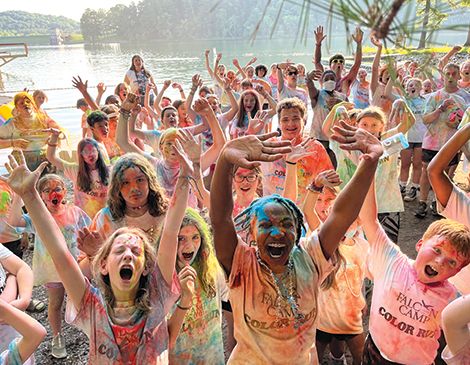
“When looking into a camp, find out how they individualize activities,” Ledel advises.
Also, inclusive and adaptive camps can specialize in certain diagnoses or categories of disability.
Adaptive Sports Ohio serves kids with physical disabilities who often do not get opportunities to participate in recreation or school sports. During summers, its track and field program includes equipment like seated racing chairs.
“They get to put 100% of their effort into the sport, and that goes beyond physical fitness and includes the social aspects of interacting with teammates and coaches, and the emotional benefits of playing with individuals who also have physical disabilities,” says Steve Olesky, regional sports manager and director of competitions. “They can all participate with a common goal without having someone ask, ‘Why are you in a wheelchair?’ It’s a safe space.”
Designed to Make a Difference
Camp Nuhop staff training includes 10 days of intensive in-service workshops along with ongoing continuing education sessions so counselors are equipped to de-escalate tricky situations and help kids “stay calm and code switch,” Dunlap says, emphasizing this preparation as a necessity for camps serving children with different needs.
"We talk to our staff about the concept of unconditional acceptance,” says Dunlap, who is also a Crisis Prevention Institute trainer. “Our training is very intentional.”
It’s designed to make a difference.
Nuhop teaches staff to identify triggers and stressors that can mount into behaviors, and how to keep campers safe, something parents should look for in a camp.
“We want every kid here to build skills that count, whether that’s social emotional, behavioral, empathy — those skills we need as humankind,” Dunlap says.
Rintamaki says one of the biggest factors of camp success for many families whose children tend to express frustration or sensory overload in an aggressive way is whether staff is properly trained to handle this response. “And, if a behavior is to refuse to participate and become noncompliant is there an extra helper on board?” she relates.
Also ask about safety procedures, Rintamaki adds. If medication management is necessary, is the camp equipped? What other medical support does your child require that must exist at camp for it to be a safe, successful experience?
These are all aspects of camp that benefit every child, whether or not a kid is on an Individualized Education Plan at school. Coping strategies, self-advocacy, social skills and building relationships are skills everyone could improve — especially given our digital age. “We want our campers to be better humans by the time they leave here, and feel good about themselves,” Dunlap says.
“Time and time again, we hear from our parents that this is the place where their child found their first real, true friend,” he adds. “That does it for me. That is amazing.”
For more updates about Cleveland, sign up for our Cleveland Magazine Daily newsletter, delivered to your inbox six times a week.

